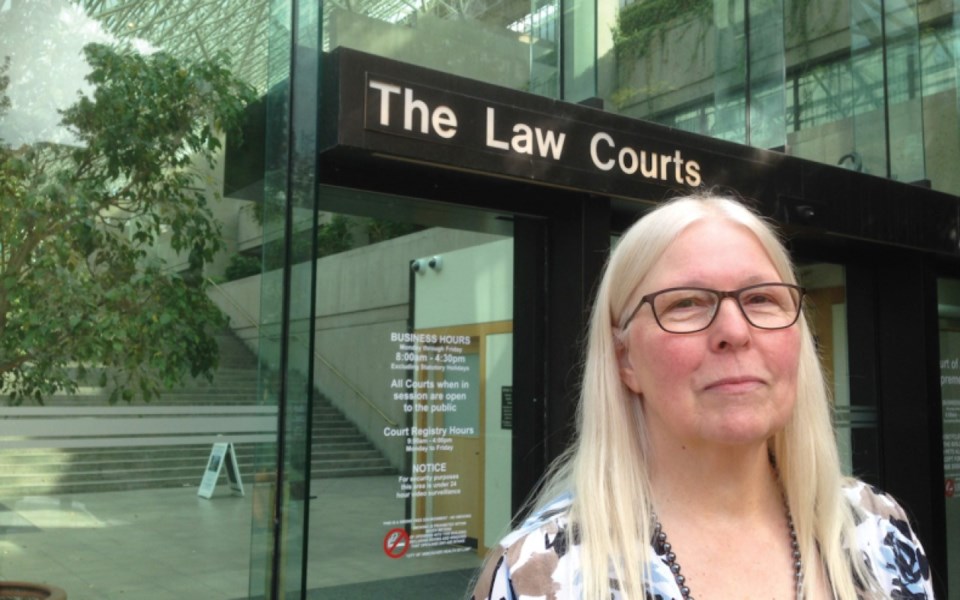The victim of 40-year-old sex assaults by a Kamloops Roman Catholic priest is seeking $2.45 million in damages, a B.C. Supreme Court judge heard March 10.
Justice David Crossin has already heard that Kamloops Roman Catholic Diocese officials knew of the alleged sexual activities of Father Erlindo "Lindo" Molon before a church schoolteacher reported months of abuse by Molon in 1977.
Indeed, church lawyers conceded when the trial began last fall that the case was about determining liability.
That teacher, Rosemary Anderson, now 70, alleged in a Dec. 22, 2016, notice of civil claim that sexual abuse at the hands of Molon, now 88, started when she was 26. She names Molon and the Roman Catholic Bishop of the Diocese of Kamloops, A Corporation Sole in the claim.
Last October in court, Anderson's lawyer, Sandra Kovacs, said said Molon "raped" her client 75 to 100 times.
Anderson is seeking $425,000 in nonpecuniary damages, $500,000 in punitive damages and $1.5 million for lost wages. The court has heard Anderson wanted to pursue a medical career. However, her psychological state after the abuses prevented her from doing so.
Anderson had gone to see Molon for solace after her father's death. Instead, he began groping her, initiating a sexual relationship, one for which she prayed to God for an ending.
"He was her spiritual father," Kovacs said of Molon. "These events were traumatic and they tipped her over the edge."
Molon's superior at the time, Archbishop Adam Exner, now 90, conceded on the stand that Molon "was molesting people," including Anderson.
"What Exner clearly admitted was that he was seeking to avoid scandal," Kovacs said in her closing argument. "He did not want to corrupt parishioners with knowledge of what Molon was doing. He prioritized the reputation of the church above the safety considerations of parishioners. That is a breach of fiduciary duty."
What remains for Crossin to determine is the extent of damages the church must pay. He must assess how Exner understood the extent of harm being inflicted by Molon on Anderson and other women in order to determine what damages he orders.
In determining the harm Molon, Exner and the church knew or ought to have known was being done to Anderson, Crossin and Kovacs agreed they must view the situation from the lens of a "reasonable person" at that time.
Kovacs said Exner had prioritized the church's image while acknowledging Molon was a problem.
Crossin had earlier questioned whether it was entirely clear Exner understood the level of harm.
Kovacs responded by arguing the "reasonable person" test must take into account what a reasonable religious person would do – and not what a reasonable secular person would do, given the church's purported moral considerations around sexual activity.
Another key factor in determining damages will be the impact the alleged sexual assaults had on Anderson's life.
Kovacs spoke about Anderson's inability to focus on pre-medical school courses in the early 1980s, lifelong anxiety and depression, a legacy of lack of trust in people and post-traumatic stress disorder.
The court has already heard how after repeated alleged sexual assaults Molon suggested marriage. At that point in early 1977, Anderson went to see Exner.
"She was upset because her relationship with Father Molon was going in a direction she did not want," Exner said in October. "There was a sexual component to it."
He agreed Anderson was vulnerable.
"I think I let her know she's not the only one. He [Molon] is promiscuous," Exner said.
But, Kovacs said, Anderson's perception is that Exner did not believe her.
That, Kovacs argued March 10, put Exner in a case of controlling an employee as an employer. She said priests swear an oath of obedience to their bishops.
Exner had a duty to control his priests, Kovacs said. But, she added, Exner had inadequately failed to investigate earlier rumours and allegation and had earlier discussed Molon as a problem.
None of it was documented, she said. "They didn't want a paper trail."
That, she said, was disobedience of canon – or church – law.
"He knew this guy [Molon] was involved," Kovacs said, "that he's a slippery character that he's a slippery character. He was wilfully ignoring it."
Further, Kovacs said, Exner knew the name of at least one other woman but would not identify her.
"He wasn't being forthright with the court," she said, suggesting the archbishop's credibility be questioned.
Last month, Kovacs told Crossin that the papal nuncio in Ottawa had been served documents to participate in the case.
"They are refusing to participate, citing diplomatic immunity," Kovacs told Crossin.
That's despite the Vatican's December announcement it would abolish the high secrecy applied to sexual-abuse accusations against clerics. The situation had been seen as shielding priests from secular authorities.
Molon wound up preaching in other parishes, including those in a U.S. archdiocese notorious for sexual abuse cases.
He later worked for the Canadian Armed Forces.
Church lawyer John Hogg is expected to make his closing March 11.
@jhainswo




